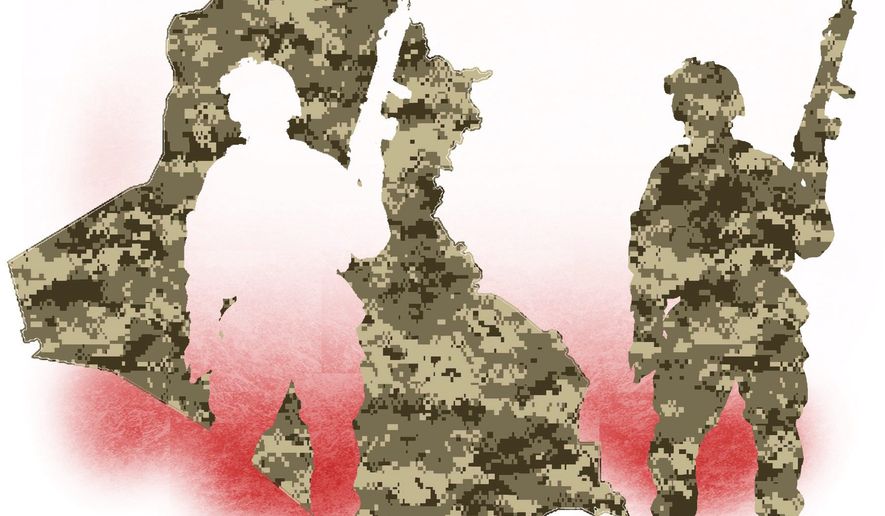OPINION:
At a recent town hall event, President Trump said he planned to withdraw American troops from Iraq. Around the same time, Gen. Frank McKenzie seemed to contradict the president, implying U.S. troops couldn’t withdraw because there was “still work to do” in training the Iraqi Security Forces.
It’s unfortunate that there hasn’t been more talk about Iraq in the lead-up to the election, as thousands of U.S. troops remain stationed there. Regardless of who is president come January 2021, a comprehensive assessment of America’s long involvement in Iraq reveals full withdrawal is the best policy for U.S. interests.
In May 2004, President Bush told the American people that Iraq was on the path to becoming a fully functioning democracy. In upcoming elections, Mr. Bush explained, “the Iraqi people will choose a transitional national assembly, the first freely-elected, truly representative national governing body in Iraq’s history” and craft a new constitution. The leader of that Iraqi-selected government turned out to be Nouri al-Maliki.
Speaking before a joint session of the U.S. Congress in July 2006, Mr. Maliki spoke of democracy and individual rights so that “future Iraqi generations can live in peace, prosperity, and hope.” It didn’t take long to discover Mr. Maliki’s speech had been filled with empty words meant to curry favor with the U.S. government.
Shortly after Mr. Maliki’s ascent to power, the insurgency in Iraq reached its violent nadir, prompting Mr. Bush to order a surge of American troops to quell the unrest. After the U.S. military succeeded in significantly tamping down sectarian violence, Mr. Maliki moved to begin eliminating his domestic political rivals.
In March 2008 Mr. Maliki moved against a militia, headed by a fierce rival, fellow Shia cleric Moqtada al-Sadr, called “Mahdi’s Army” in Basrah. Though U.S. leaders thought the fight ill-advised and doomed to failure, Mr. Maliki personally led the charge and –- backed by substantial American military help -– subdued the Shia cleric and marginalized the militia. Apparently buoyed by his success at silencing political rivals, Mr. Maliki began systematically moving against other political adversaries — especially the Sunnis–in the Iraqi army.
One of the key reasons America’s Iraq surge had succeeded in lowering the violence was because of the appropriation of thousands of Sunnis into “Sons of Iraq” groups that battled other Iraqi insurgents. In exchange for their support, the U.S. and Iraqi leadership promised that the Sunni fighters would be integrated into Iraqi society and given jobs after the war.
In 2010, however, after the violence had dramatically abated, Mr. Maliki decided to disband the Sunni groups, ignoring the promise to integrate them, leaving tens of thousands angry and unemployed. By then, Mr. Maliki had already been purging Sunni and Kurdish commanders from the Iraqi army in an attempt to eliminate any potential challenge to his political rule. The replacements were frequently political loyalists and many had no ability to lead troops in battle. That reality exploded in Mr. Maliki’s face in the summer of 2014.
In June of that year, a relatively small band of ISIS fighters entered Mosul with the intent of conducting a raid against the city’s Shia units. But the politically appointed leaders Mr. Maliki had installed panicked and literally abandoned entire divisions to their fate, getting on planes and escaping to Baghdad. When the Iraqi army leaders ran, the divisions melted away and the sympathetic Sunni population rose to support ISIS.
Neither the rise of ISIS nor the collapse of the Iraqi army in 2014 were products of America’s military withdrawal in 2011. Mr. Maliki had been gifted an enormous opportunity to make good on the pledge he made to the U.S. Congress in 2006, but he willingly chose to resort to brute force and power politics against his enemies. His efforts backfired, resulting in his own loss of power and subjected Iraq to internal divisions and violence that persists to this day.
President Obama gave into domestic political pressure in our country in 2014 and 2015, sending U.S. troops back into Iraq. Such a move may have been politically expedient, but it was militarily unnecessary. Though ISIS represented no threat to America that our armed forces would not have easily been able to handle, and the countries that were at risk from ISIS–Iraq and Syria would eventually have handled the situation on their own, albeit at a higher price for them.
That reality exposes the truth today: American security is neither enhanced by having U.S. troops on the ground in Iraq nor is it placed at higher risk by our complete withdrawal. To the contrary, we can both increase our national security and conserve our troops’ strength by removing our troops from unnecessary harm’s way. Iraq should be responsible for its own security. It is time to end the mission and bring our troops home.
• Daniel L. Davis is a senior fellow for Defense Priorities and a former Lt. Col. in the U.S. Army who deployed into combat zones four times. He is the author of “The Eleventh Hour in 2020 America.” Follow him @DanielLDavis1.




Please read our comment policy before commenting.